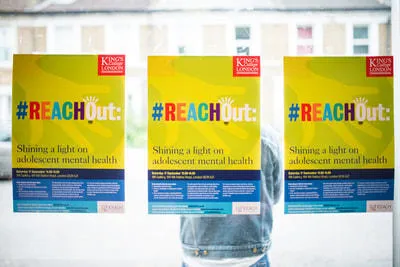As research findings continue to unfold, REACH will help us to understand the extent to which social circumstances and experiences, including experiences during the covid-19 pandemic, impact mental health trajectories among young people from diverse backgrounds. REACH will advance our understanding of resilience and protective factors and how to prevent problems and promote good mental health among young people from all backgrounds.
Dr Gemma Knowles, Research Associate, The REACH Study, IoPPN
09 February 2021
REACH Study on inner-city London schools highlights need for localised support for youth mental health
Dr Gemma Knowles, Research Associate, and Professor Craig Morgan, Professor of Social Epidemiology, lead the REACH Project, based at the ESRC Centre for Society and Mental Health, King’s College London.

Recent estimates suggest around 14% of 11-16-year-olds in England have a mental health problem. However, we know very little about the extent and nature of mental health problems among diverse groups in densely populated inner cities, where contexts and experiences may differ from the national average.

REACH (Resilience, Ethnicity and AdolesCent mental Health) is an ongoing study of adolescent mental health in inner-city London schools that has been gathering data over the last 4 years. Over 4000 young people from diverse social and ethnic backgrounds are taking part, providing detailed information, each year, about their mental health and social circumstances and experiences. REACH is generating important new information on the impact of social factors (e.g., poverty, racism, social support) on adolescent mental health. Emerging findings from the first wave of data collection, conducted between February 2016 and Jan 2018, suggest that:
- Around 20% (1 in 5) pupils in inner-city London have difficulties with mental health, compared with around 14% (1 in 7-8) nationally.
- Mental health problems were more common among girls than boys, with differences more pronounced in Year 8 and 9 students than Year 7.
- There are striking similarities, with some variations, in the prevalence of mental health problems by ethnic and social group.
- The prevalence of mental health problems was higher among those with a mixed heritage / ethnic background (25% or 1 in 4) compared with other ethnic groups.
These findings have three important implications for research, prevention/intervention, and local services and policy:
(1) While national data is important, focused local studies are needed to inform prevention strategies and local service provision.
(2) The widely reported gender differences in adult mental health likely emerge during the first few years of secondary school; which suggests that this a critical period for prevention and intervention.
(3) The many similarities in prevalence of mental health problems across ethnic and socioeconomic groups are striking and understanding these similarities should be a priority for future research; it will advance our understanding of resilience and protective factors, and therefore how to promote mental health and prevent problems, in young people from all backgrounds.
You can read the latest REACH article here: https://jech.bmj.com/content/early/2021/02/07/jech-2020-214315.full
For more information about the REACH study visit: https://www.thereachstudy.com/
Contact
For interviews or any further media information please contact Louise Pratt, Head of Communications, IoPPN: louise.a.pratt@kcl.ac.uk / +44 7850 919020


